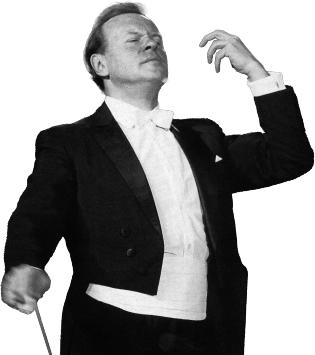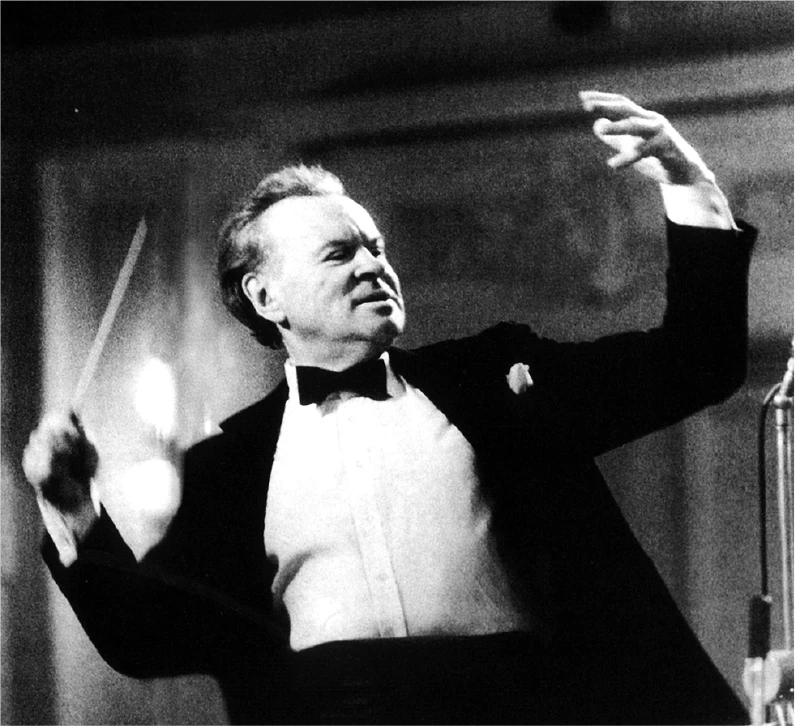Igor Reznikov
6 September 2023
Today marks the 95th anniversary of the birth of Evgeny Svetlanov—one of the greatest conductors of the 20th century, whose performances have long been considered benchmark interpretations.
He was born on 6 September 1928. Evgeny Fedorovich was fortunate to grow up in a cultured, creative family: his father and mother were soloists of the Bolshoi Theatre. It is not hard to guess that his childhood passed behind its scenes. Devoted to their children, his parents dreamed that they would take up artistic professions. When Evgeny began studying music at the age of six, they could not have been happier.
In the mid-1940s, Svetlanov studied piano at the Gnessin Music School, and then at the Gnessin State Musical and Pedagogical Institute (today the Gnessin Russian Academy of Music) with M. A. Gurvich, a pupil of the outstanding pianist and composer Nikolai Medtner. His teachers predicted a fine musical future for him. While still a student, he began his career as a pianist. After graduating in 1951, Svetlanov entered the Moscow Conservatory to study opera and symphonic conducting with A. V. Gauk and composition with Yu. A. Shaporin.
In the 1950s his professional career took flight: he became a conductor at the Bolshoi Theatre. The young maestro made his debut in 1955 with a production of Nikolai Rimsky-Korsakov’s opera The Maid of Pskov (Pskovityanka). Symbolically, this same opera would become his last production at the theatre 45 years later. From 1962 Evgeny Fedorovich served as Music Director of the Kremlin Palace of Congresses. In 1963 he was appointed Principal Conductor of the Bolshoi Theatre, where he led more than fifteen operas. A couple of years later he went to Italy and had the good fortune to conduct at La Scala. He took part in several opera productions and became the first Soviet conductor to have the honor of working in this famed theatre.
Upon returning home he was appointed Artistic Director of the USSR State Academic Symphony Orchestra, with which his subsequent career would be inextricably linked. Alongside this primary post he also held other engagements—for example, for about eight years he led the Hague’s Residentie Orkest. In 2000 the Bolshoi Theatre extended its contract with Svetlanov for several more years.
Svetlanov’s art as a conductor was recognized not only in his homeland but throughout the world. He was repeatedly invited to conduct leading foreign orchestras:
the BBC Symphony Orchestra and BBC Philharmonic;
the London Symphony Orchestra and London Philharmonic Orchestra in England;
the Philadelphia Orchestra in the USA;
the Orchestre de Paris, the Orchestre National de France;
the Orchestre Philharmonique de Radio France;
he Strasbourg Philharmonic and the Orchestre National de Montpellier in France;
the Orchestra of the Accademia Nazionale di Santa Cecilia in Italy;
the Berlin Philharmonic and the Munich Philharmonic in Germany;
the Vienna Symphony in Austria;
the Orchestra of the Royal Theatre de la Monnaie in Belgium;
the Royal Concertgebouw Orchestra of Amsterdam in the Netherlands;
the Swedish Radio Symphony Orchestra;
the Helsinki Philharmonic;
the Finnish Radio Symphony Orchestra;
the Danish National Symphony Orchestra;
the Oslo Philharmonic;
the Gothenburg Symphony;
NHK Symphony Orchestra in Japan
—an impressive, though far from complete, list of first-class ensembles conducted by Svetlanov. He also led opera and ballet productions, including Tchaikovsky’s The Nutcracker at London’s Royal Opera House, Covent Garden.
Under his baton with the USSR State Symphony performed many of the finest Soviet artists—Sviatoslav Richter, Emil Gilels, Tatyana Nikolayeva, Marina Fyodorova, David Oistrakh, Leonid Kogan, Alexander Frauchi, Fyodor Luzanov—and many leading musicians from abroad.
Svetlanov’s mastery as a conductor was made up of many components. First and foremost, flawless technique: the ability to hold all the strands of the orchestra firmly in hand; a gesture that was simple, clear, expressive, and at the same time economical. No less important was his ability to get along with the orchestra—respecting the musicians while maintaining discipline and avoiding undue familiarity.
The USSR State Symphony’s musicians spoke enthusiastically about working with Svetlanov. Each felt that the maestro was conducting for him personally, and from this they drew inspiration in concert.
Evgeny Fedorovich was distinguished by an extraordinarily wide range of artistic interests. For this reason Svetlanov was called an educator-musician. He left behind the anthology of Russian Classical Music unprecedented in scope. In Soviet times, the All-Union record company Melodiya realized the most ambitious project in the history of recording: a monumental series of orchestral works by Russian composers performed by the USSR State Academic Symphony Orchestra under Evgeny Svetlanov. The Anthology of Russian Symphonic Music was created over 25 years! The series included both universally recognized masterpieces by Glinka, Tchaikovsky, Borodin, Scriabin, Rimsky-Korsakov, Mussorgsky, Rachmaninov, and Stravinsky, and works that together restore the full picture of a century and a half of Russian musical art: orchestral music by Dargomyzhsky, Balakirev, Glazunov, Taneyev, Lyadov, Kalinnikov, Medtner, Arensky, and Lyapunov. Svetlanov possessed a unique ability to convey the spirit and mood of classic Russian music.
He regularly included works by Soviet composers in his programs (as Rodion Shchedrin once noted, “not out of duty, but out of necessity”). A whole constellation of premieres by his contemporaries is associated with Svetlanov’s name: Shchedrin’s Piano Concerto No. 3, Eshpai’s Piano Concerto No. 2, Khrennikov’s Piano Concerto No. 2 and Violin Concerto No. 2, Sviridov’s Poem in Memory of Sergei Yesenin, and many works by Khachaturian, Myaskovsky, and Shebalin. Contemporary music for him, moreover, had no geographic boundaries. Svetlanov was the first conductor in the USSR to perform Messiaen’s Turangalîla-Symphonie, Honegger’s Oratorio Jeanne d’Arc au bûcher, and Schoenberg’s Cantata A Survivor from Warsaw.
Evgeny Svetlanov’s talent was truly many-sided. Other areas of musical activity, no less important to him than conducting, remained in the shadows. It is worth recalling that he began his musical life as a pianist. Colleagues lamented how rarely he appeared in public in that capacity, while noting that the performer’s style of Svetlanov the conductor and Svetlanov the pianist had much in common: the ability to penetrate to the essence of the composer’s idea, to perceive and convey the subtlest nuances, and a vivid temperament.
Among Svetlanov’s unshakable idols was Rachmaninov. Throughout his life the conductor ardently promoted Rachmaninov’s legacy—both as conductor and pianist. Upon taking the helm of the USSR State Symphony, Svetlanov’s first undertaking was a concert cycle centered on Rachmaninov’s symphonic music. He later recorded many of the composer’s piano works as well.
Svetlanov’s educational mission was also linked to the music of Nikolai Medtner. Evgeny Fedorovich not only performed his works but also published articles about him.
A third musical incarnation of Evgeny Svetlanov is Svetlanov the composer. The maestro himself once made a seemingly paradoxical statement:
“In my life, conducting and composing probably occupy places equal in importance.”
Frédéric Chopin once said: “Happy is he who can be both composer and performer at the same time.” In earlier centuries, combining the roles of composer and conductor was quite common. In modern musical history it is rarer, apart from composers performing their own works. Gustav Mahler, Leonard Bernstein, and Pierre Boulez managed both to lead orchestras and devote time to composition—and to this list we may add Evgeny Svetlanov. Among his early works are the cantata Native Fields, the rhapsody Scenes of Spain, a Symphony in B minor, and several Russian songs. He also wrote the symphonic poem Kalina Krasnaya (The Red Guelder-Rose), Poem in Memory of David Oistrakh, Russian Variations for harp and string orchestra, the wind quintet « Twenty Four Hours in the Country », and a Piano Concerto. Contemporaries regarded Svetlanov the composer as a continuer of Nikolai Myaskovsky’s traditions. His works were highly valued not only by admirers but also by critics.
“Every one of his compositions is full of emotional openness, immediacy of expression, marked by melodic generosity and broad cantilena,”
Rodion Shchedrin, composer.
It is a pity that these works are not heard on concert stages more often today.
Evgeny Svetlanov called himself a happy man. A distinguished musician, he was always at the center of female attention. He married twice. His first wife was Larisa Avdeyeva, an opera singer and People’s Artist of the Russia. In the mid-1950s their son Andrei was born.
Larisa and Evgeny’s personal life went smoothly until 1974. That year a journalist named Nina came to their home to interview the artist. She later admitted that she fell in love with Svetlanov at first sight. During the interview it turned out that Nina and Evgeny had much in common. The man, too, took a liking to the journalist. He saw her off and suggested they meet after work. Nina could not believe that Svetlanov himself was interested in her. They met the next day; Evgeny proposed going to a restaurant. After dinner Nina invited him to her place, and that very night he stayed over. At the time she was divorced, while Svetlanov was married. He divorced his wife and married Nina, who devoted her life to him. They lived happily, though no children were born of this marriage.
In his final years Evgeny Fedorovich battled cancer. He underwent ten operations and more than twenty chemotherapy sessions, and suffered severe pain. He passed away on 3 May 2002. In his will he asked to be buried in Vagankovo Cemetery— a place, he said, that anyone could visit, unlike the prestigious Novodevichy.
During his lifetime, Evgeny Svetlanov received a great many honors:
He was a Hero of Socialist Labor, a People’s Artist of the USSR, and a recipient of numerous Soviet, Russian, and foreign orders, including Officer of the French Légion d’honneur and Commander of the Order of the Dutch Lion. He was an honorary academician of the Royal Swedish Academy and the Royal Swedish Academy of Music, of the American Academy of Arts, and Wagner’s Musical Academy; an honorary professor of the Moscow State University and of the Gnessin Academy of Music; an honorary conductor of the Bolshoi Theatre; an honorary member of the Schubert Society; and a winner of the French Grand Prix.
The memory of Evgeny Svetlanov has been perpetuated many times:
- The main hall of the Moscow International House of Music, opened in 2004, bears his name.
- Minor planet No. 4135 is named after E. Svetlanov.
- Since 2007 the international Evgeny Svetlanov Conducting Competition has been held.
- In 2012 a memorial plaque was unveiled at 11 Yeliseevsky Lane in Moscow, where the conductor had lived since 1984.
- His name has also been given to an Aeroflot Airbus A330, to a street in Moscow’s Ramenki district, to a Children’s School of the Arts in Moscow, to the Kaliningrad Regional Philharmonic, and to Children’s School of the Arts No. 11 in Yekaterinburg.
- Most importantly, in 2006 the State Academic Symphony Orchestra of Russia— the ensemble with which the musician’s most fruitful years were associated—was officially named after Evgeny Svetlanov.


